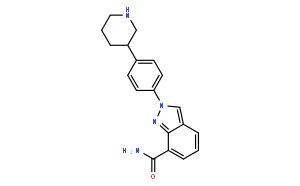| In vitro |
In a whole cell assay, MK-4827 inhibited PARP activity with EC50 = 4 nM and inhibited proliferation of cancer cells with mutant BRCA-1 and BRCA-2 with CC50 in the 10-100 nM range. It was demonstrated
to be a potent and selective PARP-1 and PARP-2 inhibitor with IC50=3.8 and 2.1 nM, respectively. Furthermore, it displayed at least a 100-fold selectivity over PARP-3, V-PARP, and tankyrase-1, with IC50 = 1300, 330, and 570 nM, respectively. As well as inhibiting the growth of HeLa cell lacking BRCA-1 because of silencing by RNA interference, MK-4827 is able to inhibit the proliferation of cancer cell lines carrying natural BRCA-1 or BRCA-2 mutations. In MDA-MB-436 human mammary gland adenocarcinoma cells carrying BRCA-1 mutations, MK-4827 displayed CC50 = 18 nM, while in CAPAN-1 human pancreatic adenocarcinoma cells, which are BRCA-2 mutant, MK-4827 displayed CC50 = 90 nM. In contrast, normal human prostate and mammary epithelial cells are resistant to MK-4827, displaying antiproliferative effects in the micromolar range, thereby demonstrating the very high selective cytotoxicity from these PARP inhibitors in BRCA-1 and -2 mutant cancer cells compared to surrounding tissue[2].
|

 COA
COA MSDS
MSDS HPLC
HPLC NMR
NMR